Citrus trees need different nutrients to be strong and healthy and produce lots of delicious fruits. Although there are many types of Citrus trees, their needs are almost the same: nitrogen, phosphorus, potassium, sulfur, and calcium. A Citrus tree doesn’t mean a lemon tree. Lime, Oranges, Grapefruit, Kumquats, and Tangelos are also Citrus plants. All these fruits come in many different varieties and may require different temperatures and environments to grow properly. Let’s check out the best fertilizer for Citrus tree.
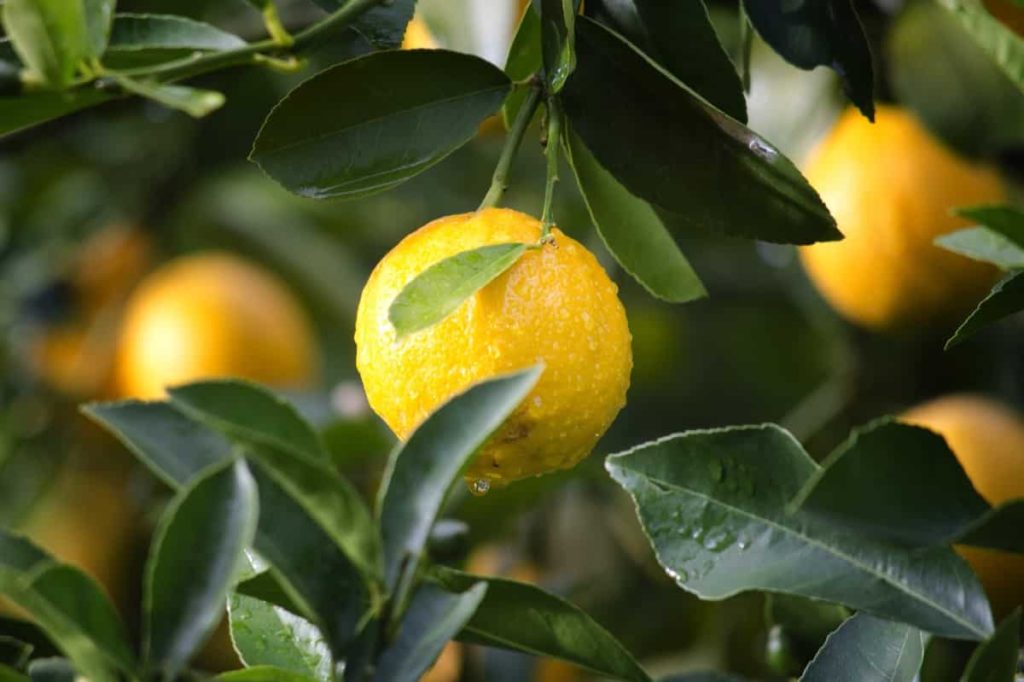
Feed your Citrus trees with fertilizer or apply food specifically designed for Citrus fruit trees. This is important because these fruit trees prefer the condition of acidic soil for maximum growth and Citrus fertilizers are formulated to meet their requirement. Citrus trees appreciate the fertilizer that is high in nitrogen potassium but less in phosphorus. Fertilizing Citrus at the right time with the right amount can make a huge difference to the production of fruit, so buy the best fertilizer for Citrus trees and start fertilizing.
Nitrogen is the most widely nutrient used for Citrus plants. It is used to produce leaves, flowers, and eventually fruit. Phosphorus helps in storing energy and digesting nutrients. Essential nutrients used in cell distribution. Potassium is used to help produce fruits, flowers, and leaves like nitrogen. Calcium also performs the same task. Magnesium and Sulfur improve root growth. Citrus plants also benefit from micronutrients like Iron, zinc, boron, manganese, copper, molybdenum.
Best fertilizer for Citrus tree
Homemade fertilizers for the Citrus tree
Epsom salt
Magnesium deficiency can be overcome using Epsom salts. Apply 45 grams of Epsom salt in 1 gallon of water by dissolving and spraying on Citrus leaves in spring after the leaves have increased.
In case you miss this: Lemon Seed Germination, Growing from Seed (Citrus)
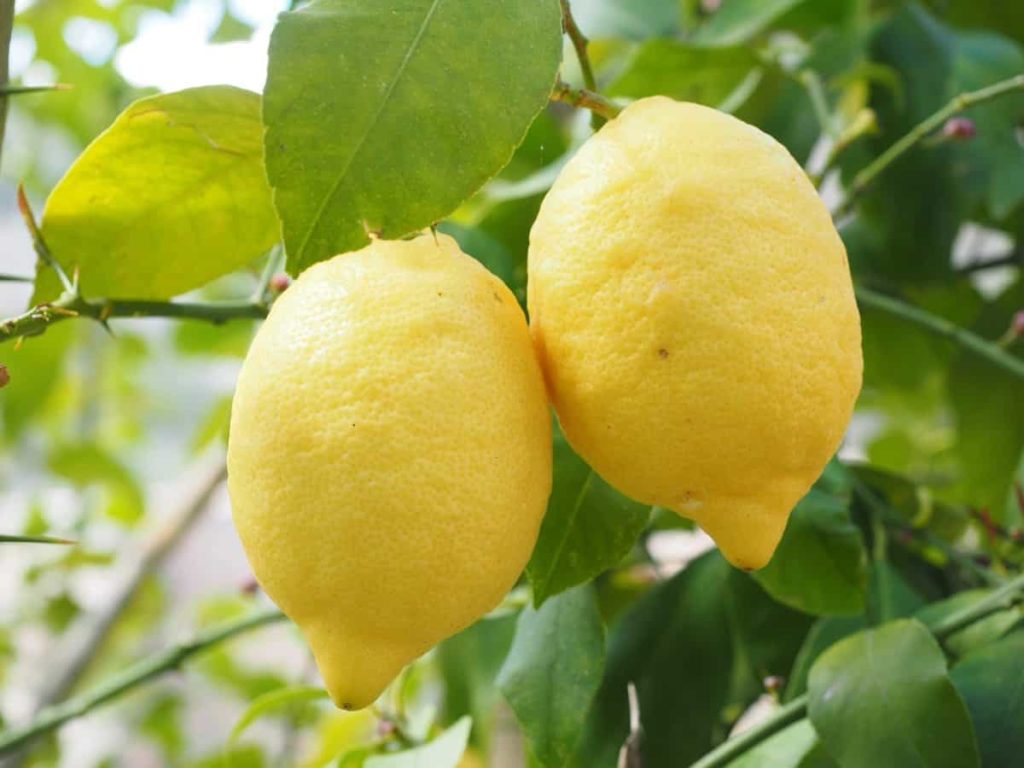
Coffee grounds, eggshells
Coffee grounds and egg peels have generally been found to be extremely nutritious for plants. Egg peels give the soil much-needed calcium while coffee ground gives nitrogen, potassium, and phosphorus. They do it very slowly so you can leave them as they have been for a long time.
- Combination 1– Leaves, eggshells, kelp meal
- Combination 2– Grass clippings, bone meal, banana peels
- Combination 3 -Coffee ground, eggshells, banana peels
All these combinations will make good homemade manure for your Citrus trees. Leaves, grass, and coffee grounds will provide high amounts of nitrogen, while bone meal, eggshells, banana peels, and kelp provide healthy amounts of phosphorus and potassium. You can apply homemade fertilizer under the soil, away from the bottom of your Citrus tree.
Natural fertilizers for the Citrus tree
You should add grass trimmings to the soil to add nitrogen. Remove mulch away from the base of the Citrus tree and sprinkle the grass clippings on the soil. Citrus trees have very shallow roots and love good organic mulch Sugarcane and pea straw are perfect. Cover the soil slightly and water down.
Compost manure for the Citrus tree
Compost
Add compost to the soil around the Citrus tree to add other nutrients to the soil. Spread around 2 inches of compost, but keep it at least two inches away from the stem to avoid damage.
In case you miss this: Best Fertilizer for Plum Trees: Homemade, Organic, Compost, Natural, Liquid, When and How to Apply
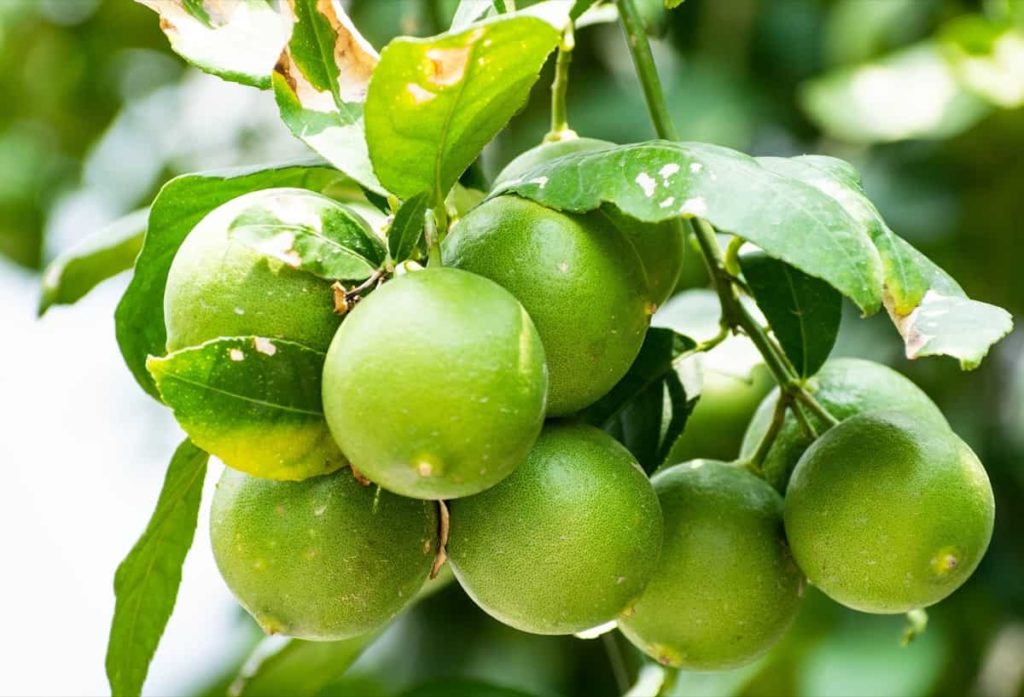
Chicken manure
Apply pelleted chicken manure on Citrus trees to promote nitrogen to encourage strong stem and leaf growth. Put 2 to 3 handfuls of pellet chicken manure around the root zone of your Citrus tree and water it well. Add fresh chicken manure to your compost bin for at least 6 months then add over the soil. Or mix the aged chicken manure with the worm castings and place it around the base of the tree.
Organic fertilizers for the Citrus tree
- Spread bone meal on the surface of the soil to add phosphorus. Phosphorus helps the Citrus trees bloom.
- Mix four parts of seed meal, one part dolomite lime, one half bone meal, and half part kelp meal. Mix the ingredients well. Apply about 1 pound of this fertilizer on the ground around a small tree which will increase the amount of manure for large trees. The kelp and seaweed extract supply zinc and iron.
- Fish food contains 10% nitrogen, so you’ll need to apply 4.5 kg of fish meal to get 453 grams of nitrogen. Shrimp and crab food contains 25 and 30% nitrogen respectively.
Liquid fertilizers for the Citrus trees
Seaweed: For a soluble seaweed extract, the rate of 1 and 1/2 teaspoon powder can dissolve in 1 gallon of water in a sprayer, applied from tree leaves to driplines.
Commercial fertilizers for Citrus tree
For best results, you should test the soil to determine that soil needs to get the right fertilizer as the best fertilizer for soil depends on the balance of nutrients in the soil. The most important nutrients are nitrogen, phosphorus, and potassium for Citrus trees. The proportion of NPK is determined by the percentage of nutrients in the soil. So that is why it is important to take the soil test. Commonly used NPK ratio for Citrus trees balanced 10-10-10 fertilizer. To get the best results for your orange trees, you need the best Citrus fertilizer, which is not more than 8-8-8, just like a lemon tree.
Citrus trees have low phosphorus requirements, so a good Citrus fertilizer will have a high nitrogen and potassium ratio. Citrus is sometimes suffered from micronutrient deficiencies like zinc or iron. These deficiencies can be overcome by applying a foliar application of liquid chelated micronutrient solutions as new growth emerges in spring. You can also apply micronutrients in sulfate forms, such as zinc sulfate or iron sulfate on the soil. Make sure to choose one specially prepared for Citrus trees when you choose a fertilizer.
Citrus tree fertilizer schedule
To find the best time to fertilize your Citrus tree, decide based on the physical shape and growth of the tree. A tree that looks dark green and holds fruit often doesn’t need fertilizers. Adding too much fertilizer when the tree is healthy can cause a lack of fruit. Citrus trees are most nutritious hungry from the time they bloom to the fruits firmly set, it is important to apply the fertilizer for your citrus trees at the time of blooming.
In case you miss this: Best Fertilizer for Passion Fruit: Organic, Homemade, Liquid, Natural, NPK, Compost, When and How to Apply
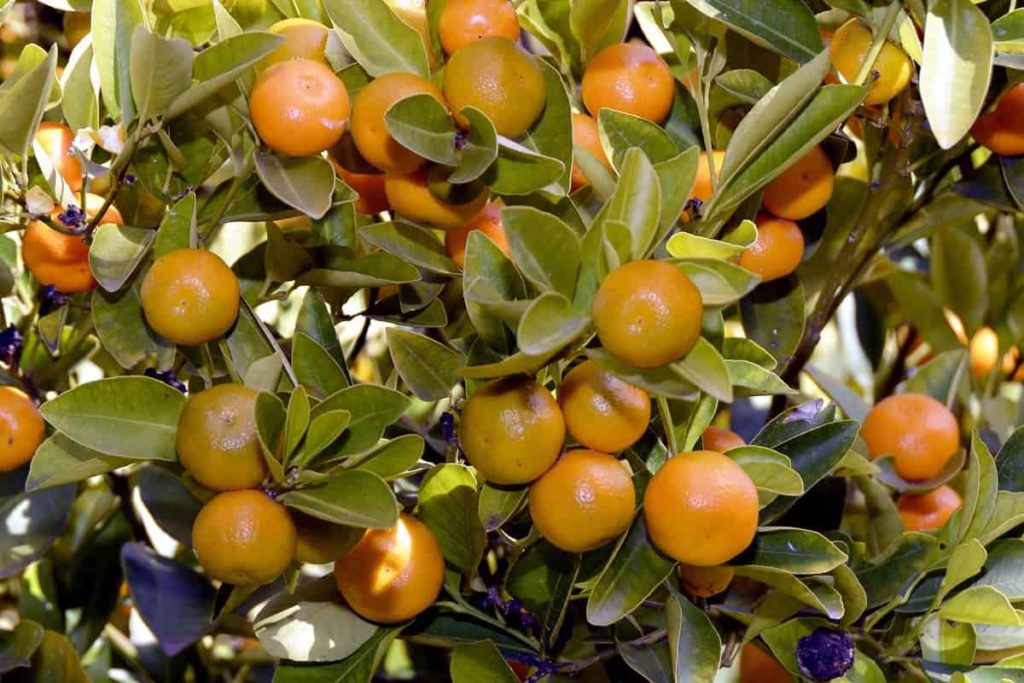
Usually, you apply the fertilizer to your citrus plants once 30 or 60 days during its growth period, and fertilizers should be applied preferably in the summer and spring season. You apply fertilizers in the fall or winter season once in 2 or 3 months.
The young trees need more attention than mature trees. Young Citrus will flower freely after being in the ground for two years and start flowering regularly in the fourth year. First-year trees should get 226 to 450 grams of fertilizer five to six times a year, for a total of 1.3 to 2.7 kg a year. Two-year-old trees need 450 to 680 grams four to five times each year. You can follow your first-year schedule, but give your tree last fertilizing in September to help it through the last part of the year.
After the same fertilizing schedule, 3-year-old trees should get 900 grams four to five times a year, which will increase to 1.3 kg during the fourth year, a total of 5.4 to 6.8 kg. Gradually increase the amount of fertilizer on each application, and reduce the number of applications, until you reach a maximum of 3.6 kg per application three times every year for a total of more than 11 kg annually.
If your Citrus is planted in the lawn area, near decorative plants, near other trees, planted in an area that contains a lot of water, or you see a decrease in the color or number of leaves, see other signs of cracked bark or marginal health, the tree probably needs more nutrients and you include an additional application Should. If your tree has healthy, dark green leaves, full flowers, and healthy growth, you can maintain a schedule three times a year and you may be able to reduce the amount of fertilizer to the recommended minimum amount.
How to fertilize Citrus trees in pots
For potted Citrus trees, the soil mixture is extremely important and should be carefully selected. Since Citrus roots suffer from root rot, soil mixture should be light, and drainage and air should be promoted. For best results, soil containing large particles such as wood chips, peat moss, or thick sand will help prevent the root from being saturated. During the active growth months often in spring and summer feed the pot Citrus tree once a month.
In case you miss this: Best Fertilizer for Kiwi Tree: Homemade, Organic, Natural, Liquid, NPK, And Compost Manure
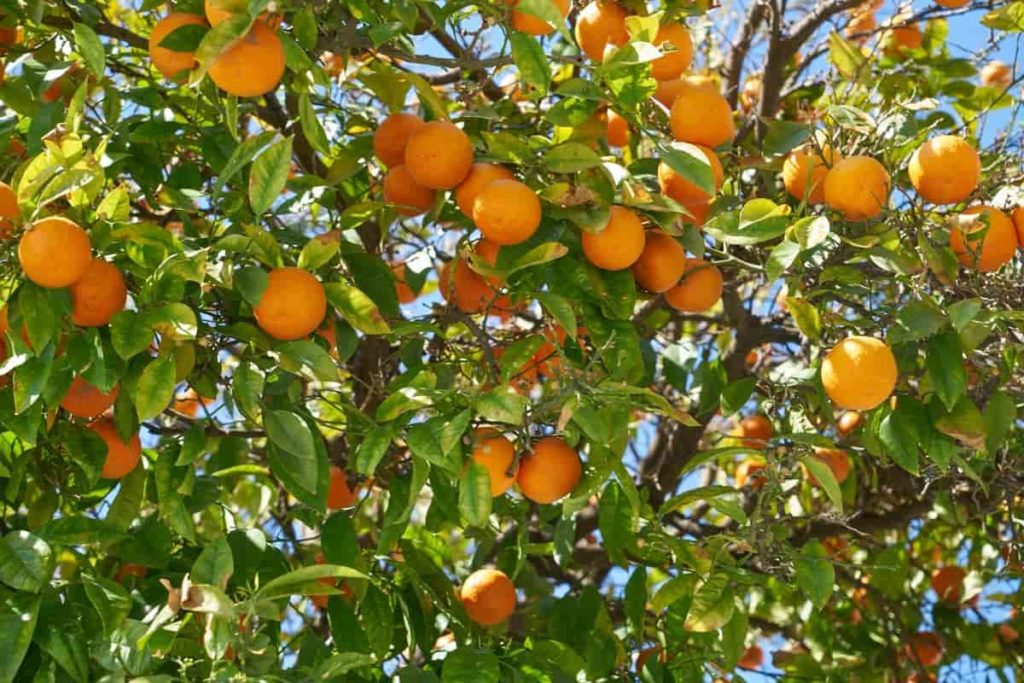
Avoid fertilizing your tree during passive growth during the winter months as it will be inactive and will not require many nutrients. In a cool climate, move your Citrus indoors as new growth can be damaged by frost. However, some cold weather may be good for Citrus trees and can boost the production of more flowers and fruits.
Once your tree starts bearing fruit, reduce the dose during active and passive months. In general, new growth begins in late winter and early spring, at which point you should start active feedings. Remember, since there is less soil to work with potted Citrus trees, they will need very little fertilizer and less frequent than planted Citrus trees.
Frequently asked questions about fertilizers for Citrus trees
Is Miracle-Gro good for Citrus trees?
Why not? you can use miracle-gro fertilizer for your citrus plants, however, you can get other good fertilizers in the market.
What causes yellow leaves on Citrus trees?
Often yellow leaves or chlorosis on a Citrus tree is caused by overwater or lack of nutrients. Citrus requires regular water, especially during hot months but giving more water can drain nutrients from the soil and cause root rot. If the roots get damaged, they cannot take the nutrients that the plant needs.
In case you miss this: Best Fertilizer for Avocado: Homemade, Organic, Natural, Liquid, Compost Manure, NPK, and Schedule
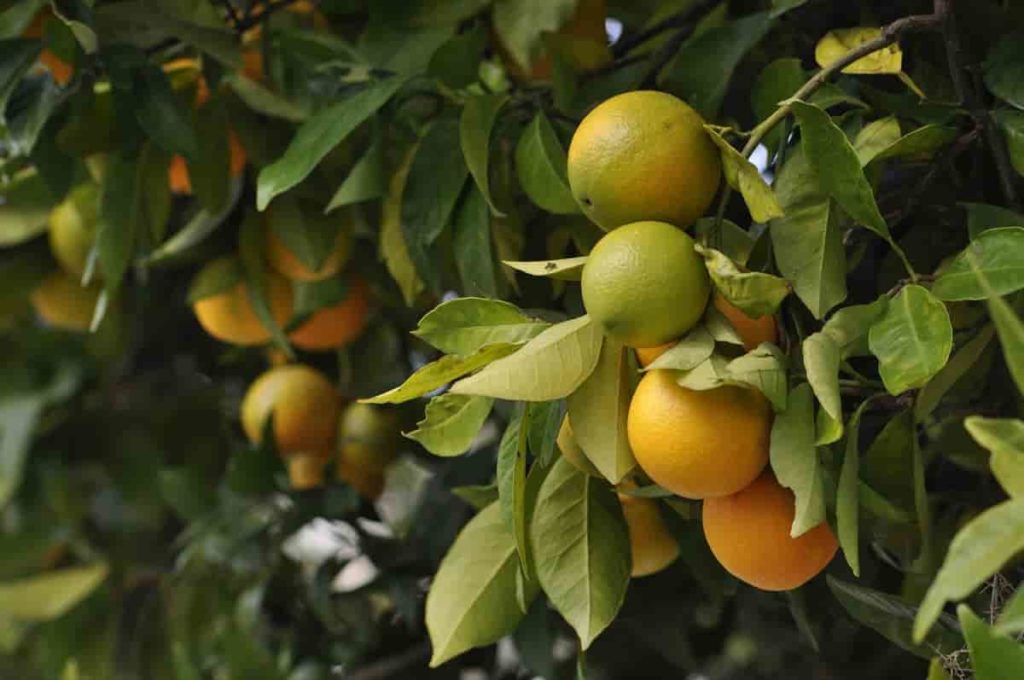
Why are my Citrus trees not producing fruits?
Lack of flowers means your tree can’t produce. Some of the reasons for this will be lack of nutrients, inadequate water, and bad rootstocks. If the plant bloom but still fails to take fruit, it could be because the tree is not old enough.
- How to Grow Hibiscus from Flower
- Plantation Ideas for Home Decoration: A Beginners Guide
- Flower Garden Designs and Layouts for Beginners
- Planting and Spacing Techniques in Papaya: A Beginner’s Guide
- Growing Gold: Essential Techniques for Planting Pineapples
- How to Make Kalanchoe Plant Bushy: Home Remedies and Solutions
- 11 Reasons Why Your Gardenia is Not Blooming: Home Remedies and Solutions
- Eco Elegance: The Guide to Designing a Drought-Tolerant Landscape
- Gardening on a Slope: Strategies for Hillside Landscaping
- Nourish and Flourish: Top Organic Mulches for Thriving House Plants
- Everything You Want to Know about Indian Mogra Flower: Discover Uses and Growing
- Green Thumb Success: Expert Tips for Cultivating Greenhouse Pumpkins All Year Round
- Maximize Growth & Flavor: The Ultimate Guide to Companion Planting in Herb Gardens
- How to Control Rhododendron Problems Naturally: Home Remedies and Organic Ways to Fix Them
- Natural Magic: The Remarkable Benefits of Cinnamon for Plants
- Best Steps to Revive Dying Tulip with Natural and Organic Treatment
- 10 Reasons Why Your Angel Trumpet is Not Blooming: Remedies and Treatment
- How to Fix Periwinkle Leaf and Flower-Related Problems: Natural Remedies and Solutions
- How to Fix Zinnias Leaf and Flower Problems: Discover Natural and Home Remedies
- Organic Steps to Induce Lemon Tree Flowers: A Comprehensive Guide
- Bloom Booster: Crafting the Perfect Homemade Bougainvillea Fertilizer
- Optimizing Growth: A Guide to Applying NPK Fertilizer for Potted Plants
- 10 Best Homemade Fertilizers for Rubber Plant: DIY Recipes and Application Method
- How to Boost Female Pumpkin Flowers: Effective Steps for More Flowers and High Yields
- Transform Your Indoor Garden: Top Benefits of Pink Salt for Houseplants
- 10 Best Homemade Fertilizers for Peacock Plants (Calathea): Easy DIY Guide
- Unlock Blooms: 9 Reasons Why Your Potted Chrysanthemum is Not Blooming
- 8 Reasons Why Your Potted Hibiscus is Not Blooming: Fix it with Simple Solutions
- Unlock Blooms: 9 Key Reasons Your Potted Frangipani Won’t Flower
- 10 Reasons Why Is My Ice Plant Not Blooming: Remedies and Treatment
- 10 Reasons Why My Potted Hydrangea Not Blooming: Treatment and Remedies
- 10 Reasons Why is My Wisteria Not Blooming: Remedies and Treatment
- 10 Reasons Why is My Goldfish Plant Not Blooming: Remedies and Treatment
- Maximize Your Space: Ultimate Guide to Balcony Gardening with Grow Bags
- 10 Reasons Why Your Iris is Not Blooming: Remedies and Treatment
- 10 Reasons Why Your Anthurium Plant is Not Blooming: Treatment and Remedies